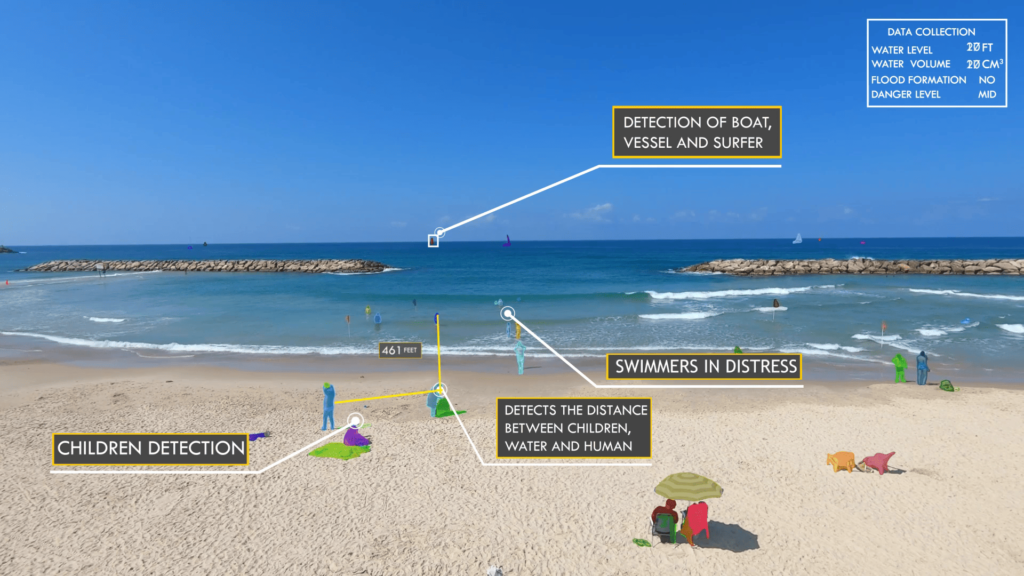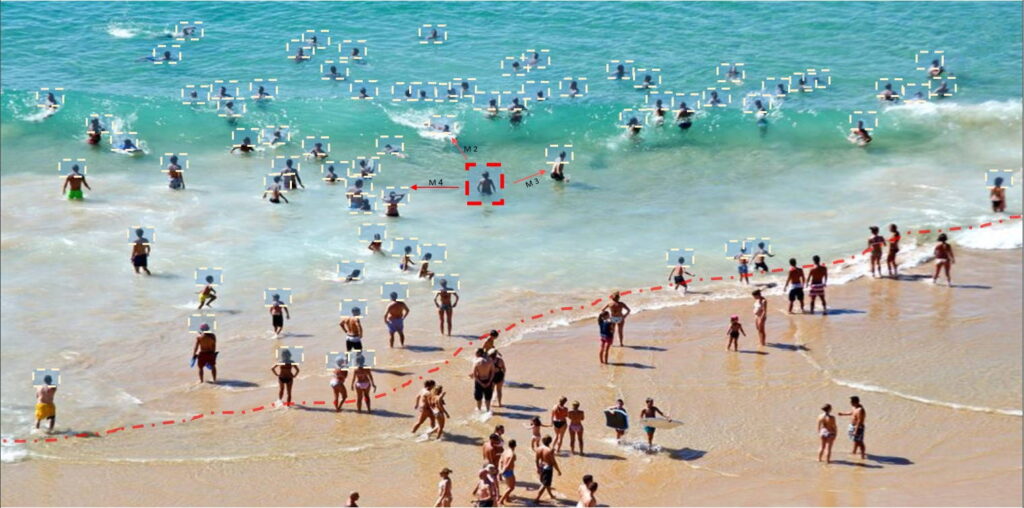When Israeli businessman Adam Bismut saw a man lose his life by drowning at the Dead Sea because help was too far away, he was determined to stop such tragedies from happening again.
Drowning is a widespread problem. According to the World Health Organization, at least 236,000 people lose their lives each year in the water. It is the third leading cause of unintentional injury death worldwide, the WHO says, and accounts for 7 percent of all global injury-related deaths.
Bismut’s personal journey led him to found Sightbit, a drowning prevention platform that uses AI to spot dangers on and in the water and alerts lifeguards to people in peril in real time.
Risks in the water mean that lifeguards must constantly be alert, but from a distance it is not always easy to tell if a person is actually in trouble.
“We needed to develop a platform that can manage the beach and also prevent drownings,” Bismut, who is the company’s CEO, tells NoCamels.

The Sightbit system has two key features. The first is reading the state of the water: The AI can recognize a range of wave movements and detect any dangerous areas for swimmers, kayakers and anyone in or on the water.
“Most drownings are actually because of water conditions, like the waves and the rip currents,” explains 35-year-old Bismut.
The second feature of the platform is detection of people and objects in and near the water. The system can differentiate between children and adults, and between boats, jet skis and other moving vehicles. Each of these different categories means different safety concerns, such as the depth of the water that children can safely enter as opposed to adults.
The system analyzes an area using any available cameras in the location. Once this is completed, it presents the data on a dashboard that can be accessed by lifeguards and other officials on multiple devices such as monitors, smartphones and smartwatches.
Furthermore, if the platform detects any risks in real time, a notification is sent to the nearest lifeguard, who can then respond immediately and prevent people from entering risky areas of the water.
“We can give our customers a lot of information that can help them to manage public security or public safety in the area of the water,” Bismut says.
He believes AI can be a crucial tool in drowning prevention as it is normally difficult for lifeguards or video monitors to detect people and movements inside the dynamic and perennially shifting water.
Sign up for our free weekly newsletter
SubscribeThe platform is in use in the US, Canada, Brazil, the United Arab Emirates, Australia and Israel in a range of different places from the beach to yacht clubs and private resorts.
“A lot of people like to invest in the smart city,” Bismut says.
In Israel, Tel Aviv and Ashdod municipalities are using the system in order to protect people on the beach, while the Israel Electric Corporation has deployed it to prevent people from approaching its hydroelectric pumps situated near the shore.

And after a while, the system’s dexterity surprised even its creators, who realized that it also detects color changes in the water. These changes indicate the presence of pollution, and the data could be sent to the companies or governments responsible.
Furthermore, Israeli defense officials are beginning to use the AI system to detect dangerous items in the water, such as bombs or even small boats operated by enemies.
So successful has the startup been in the four years since the platform was launched, Bismut says, that companies who were only interested in purchasing the final product are now clamoring to invest in Sightbit.
There is also a waiting list of countries that want the system in place on their beaches and other waterways. And Bismut says they always carry out a crucial inspection of the landscape and monitoring systems available at the site before they agree to place the product in a new locale.

In the future, the company wants to be able to connect the AI platform to drones who would join the rescue effort. Bismut says this would facilitate the rescue as sometimes it can take too long for a lifeguard to reach a drowning person.
A drone, on the other hand, can easily spot the right area from the air and drop a flotation device to the person in trouble.
“We believe that every beach around the world can be safe,” says Bismut. “Our focus today is to save lives.”
Editor’s note: Just days after talking to NoCamels about his life-saving innovation, IDF Sgt. Maj. (res.) Adam Bismut fell in battle in the Gaza Strip on January 22, 2024. May his memory be a blessing.
Related posts

Editors’ & Readers’ Choice: 10 Favorite NoCamels Articles

Forward Facing: What Does The Future Hold For Israeli High-Tech?

Impact Innovation: Israeli Startups That Could Shape Our Future




Facebook comments